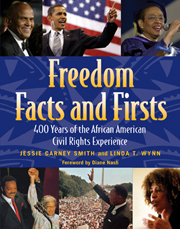
Muhammad Ali (1942--)
Boxer
Born January 17, 1942, as Cassius Marcellus Clay Jr. in Louisville, Kentucky, Ali started boxing because he thought it was "the quickest way for black people to make it." After winning the 1960 Olympic gold medal as light#heavyweight, he turned professional. In 1963 he converted to Islam, though the faith strongly disapproves of boxing, and changed his name. A year later, Ali won the world heavyweight championship by knocking out Sonny Liston.
Nine successful title defenses followed before Ali's famous war with the Army began. Refusing to serve in the armed forces during the Vietnam War, Ali maintained that it was contrary to Muslim tenets. Stripped of his title and banned from boxing in the United States, Ali faced prison, but he refused to back down and was finally vindicated by the U.S. Supreme Court in 1970.
Coming back to the ring after a three-and-a-half year layoff, he worked his way up for another title shot. His biggest matches along the way were Superfights I and II against Joe Frazier, in which Ali suffered his first loss and evened the score in a return match.
Few fans gave Ali a chance against heavyweight champion George Foreman when they met in Zaire on October 30, 1974. A four-to-one underdog at ring time, Ali amazed the boxing world, knocking out his stronger, younger opponent. After regaining the crown, Ali knocked out Chuck Wepner and Ron Lyle, and decisioned Joe Bugner. In 1978, after fighting Frazier for the third time, Ali lost his title to Leon Spinks and briefly retired.
Ali fought well past his prime regaining his title briefly from Leon Spinks. In December 1981 Muhammad Ali entered the ring and lost a bout against Canadian heavyweight Trevor Berbick. It was a rare occasion and an inauspicious end to a career for a fighter who had won the heavyweight title three times. Ali retired in 1981 and in 1982 he was diagnosed with Parkinson's disease.
In 1996 Ali was selected to light the Olympic torch in Atlanta, Georgia. In 2001 the film Ali was produced starring Will Smith which earned an Academy Award nomination. In 2005 Ali opened the non-profit Muhammad Ali Center, which displays Ali memorabilia addresses issues of personal growth, peace, and social responsibility.
Ali has received numerous awards and recognition for his personal dedication to his faith and his uncompromising view on race and politics. He also has traveled extensively as an ambassador of good will. Because of his work in the civil rights movement Ali was awarded the Presidential Medal of Freedom and the Otto Hahn Peace Medal in Gold from the United Nations.
From African American Almanac: 400 Years of Triumph, Courage and Excellence by Lean'tin Bracks, (c) 2012 Visible Ink Press(R). A wealth of milestones, inspiration, and challenges met . . .
 |
African American Almanac: 400 Years of Triumph, Courage and Excellence
by Lean'tin Bracks, PhD
A wealth of milestones, inspiration, and challenges met. . .
The most complete and affordable single-volume reference of African...
Read More »
|
ISBN: 9781578593231
$29.95
|
 |
Freedom Facts and Firsts: 400 Years of the African American Civil Rights Experience
by Jessie Carney Smith, Ph.D. and Linda T Wynn
Spanning nearly 400 years from the early abolitionists to the present, this guide book profiles more than 400 people, places, and events that have...
Read More »
|
ISBN: 9781578591923
$44.95
|
 |
Black Firsts: 4,000 Ground-Breaking and Pioneering Events, 2nd Edition
by Jessie Carney Smith, Ph.D.
Black Firsts is a testament to a rich but often overlooked part of our history. Jessie Carney Smith, William and Camille Cosby Professor of the...
Read More »
|
ISBN: 9781578591428
$24.95
|
 |
Black Heroes
by Jessie Carney Smith, Ph.D.
"If there is no struggle, there is no progress," wrote Frederick Douglass. "This struggle may be a moral one; or it may be a physical one; or it may...
Read More »
|
ISBN: 9781578591367
$69.95
|









